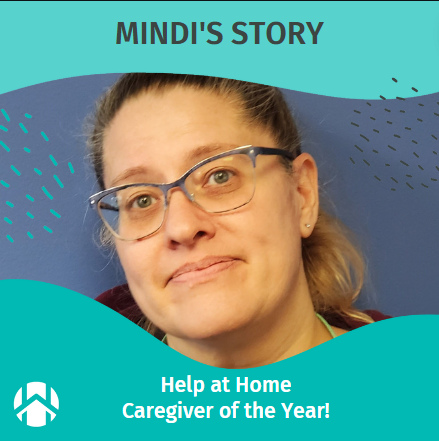Mindi’s Story: Combatting Loneliness and Social Isolation through Companionship and Conversation

We want to congratulate our very special Help at Home caregiver Mindi in Allegan, MI, for being recognized as a Help at Home caregiver of the year! She has been a caregiver for more than five years. Over that time, she’s worked with clients who are facing physical, mental, or aging-related health challenges. It’s not always easy, but she says one of the things she loves about the job is she gets to talk – a lot!
“What other job can you talk and talk and talk?” Mindi told us with a laugh.
Most of her clients live alone and crave social interaction. They enjoy hearing about Mindi’s day, and she also enjoys encouraging them to tell their stories.
Mindi said even clients with short-term memory problems can share stories from long ago. “If you can get them talking about their past or when they grew up, they have a treasure trove of information,” she said.
Clients may seem quiet at first, but she said they will quickly warm up and let you see what they love talking about the most – a favorite tv show, their grandkids or even the weather. Sometimes she sings with them. Often clients with dementia can sing songs or hymns that they learned in childhood, even after it’s hard for them to have long conversations.
Helping clients retains control of their own lives
Caregivers enable clients to continue living at home by assisting with important daily tasks. Mindi helps her clients by preparing meals, helping with bathing, or doing laundry.
Over the years, Mindi has found that many clients are initially hesitant about having a caregiver. They realize they need help but are understandably worried about giving up control of their home and their life. Mindi has found that things go better when she uses subtle word choices to remind them that they are in charge.
She doesn’t say “I’m going to make your lunch now.” She will say “what are we going to make for lunch today?” Or she will ask them “what do we have on our list today?” Using the plural pronouns “we” and “our” sometimes makes a difference, she said. It helps reassure the client that they do have a say in what she does.
Often, the clients who were initially wary about having a caregiver want her to stay even longer. “They never want you to leave,” she said. “They’ll keep you talking… There’s always one more thing they would like for you to do.”
Mindi said she often ends up staying a few minutes later than she intended – getting her client a glass of water, taking their garbage out, or listening to one more story. Those last-minute requests are a sign that the client really values her time with them and doesn’t want it to end. She said she is always willing to stay a few extra minutes.
It can be hard to see clients as they become weaker or sicker, but there is satisfaction in knowing that she is helping them live out their lives where they want to be – at home.
“You’re going to get attached,” she said. “But, I love helping them.”
